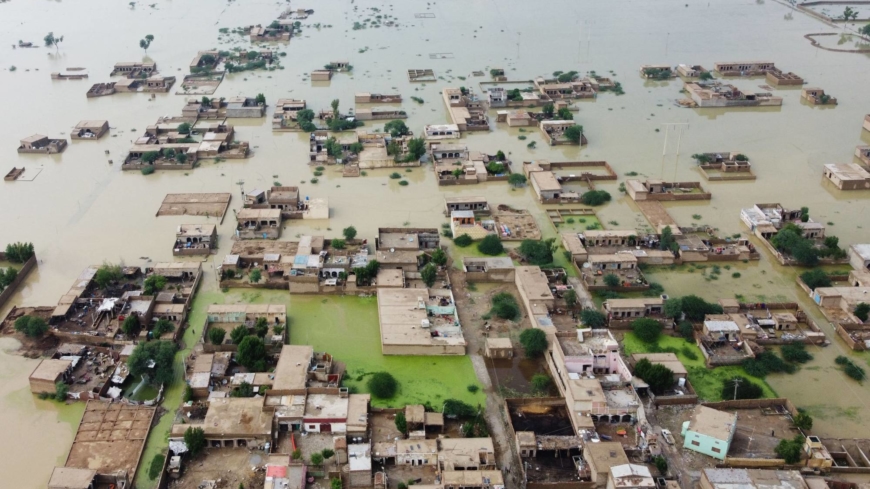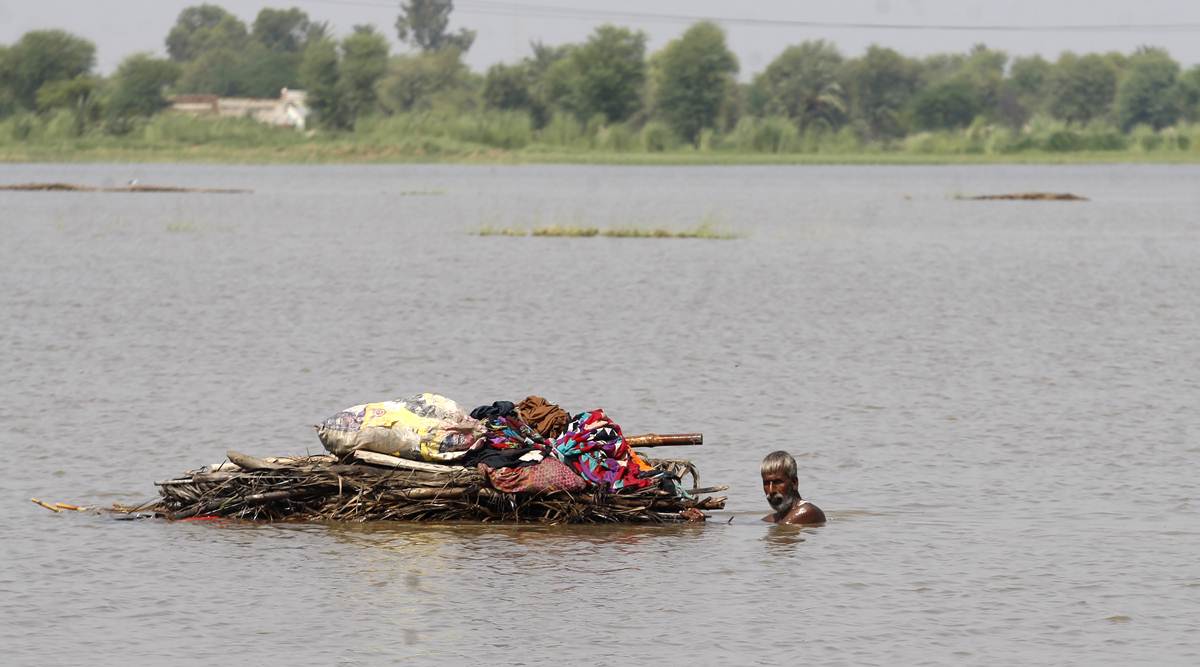Pakistani floods endanger food security by destroying crucial crops.

Large tracts of agricultural land have been damaged by flooding in dozens of districts in Pakistan’s Baluchistan, Sindh, and Punjab provinces. If thousands of acres of crops are not recovered, the nation may experience food shortages in the near future.
If the farmlands are not soon drained away, we are concerned that we won’t be able to plant crops for the winter season, the most important of which is the wheat harvest.
I’ve only had my current supply of vegetables for the previous several days. A vegetable vendor in Islamabad, seated with a cart of largely rotting onions, said, “I am waiting for the imported stock of onions and tomatoes to reach the warehouses so we may sell those.” Pakistanis worry that they won’t be able to find basic foods in the marketplaces. To address the issue, the government is importing tomatoes and onions from Iran and Afghanistan, two close neighbors.
In collaboration with the UN and other international organisations, Pakistan’s National Disaster Management Agency (NDMA) is in charge of organising relief activities. Over 464,000 individuals in Balochistan, Khyber Pakhtunkhwa (KP), and Sindh have received food aid from the World Food Programme (WFP) of the United Nations.
According to a situation report from September, the WFP also said that it wants to offer 1.9 million people in flood-affected regions who are experiencing food insecurity food assistance. Villagers are stealing food boxes from one another during distribution trips because of how bad the situation is there. The sight of that is very terrible. Abid Mir, professor at a university in Sindh and social activist,
According to Muhammad Younas, a representative of the Provincial Disaster Management Authority in Balochistan, residents get international relief through the NDMA. The district administration and other administrative entities get help from the NDMA once it is transferred to the provincial disaster management authority by those organizations.
International NGOs work with local partners in their own communities. They have their own systems and methods for determining the requirements and damage of the victims. To labor in a specific location, however, they must first obtain authorization from the government, Younas continued. Through the Benazir Income Support Programme (BISP), the Pakistani government intends to give monetary assistance to more than 4.5 million flood-affected households, but Islamabad has come under fire for not doing more to get ready for the monsoon season.
A farmer named Saqlain Abbas from Punjab’s Rajanpur area told DW that not enough precautions were made to save houses and property during the monsoon season.For years, he added, his family had relied on growing its own rice and wheat, and now all of those crops were immersed in water. The WFP said that following its first relief effort by “building community infrastructure,” it will launch “climate resilience” projects in Pakistan the following year.
However, renowned economist Kaiser Bengali told DW that receiving significant help will not be simple for the Pakistani government. “One, donors are becoming tired. Two, in order to raise the additional funds needed for flood repair, Pakistan must reduce non-development spending, including the non-combatant defence budget, ration gasoline, and forbid imports of non-essential goods.
The monsoon floods occur as Pakistan struggles with a protracted economic crisis, with rising inflation driving up the cost of basic foods. A crucial source of revenue would undoubtedly be affected by the flood damage in Pakistan, which is also a significant exporter of agricultural goods. Pakistan’s Bureau of Statistics reports that during the fiscal years 2021–2022, the country exported rice for a record $2.5 billion (€2.5 billion).
Flood-stricken 42% of the rice is produced in the province of Sindh. Flooding was particularly severe in rice-growing regions, according to a report by the NGO International Center for Integrated Mountain Development (ICIMOD) analyzing crop damage in Sindh. This has caused an estimated loss of 1.9 million tonnes of rice, or 80% of the province’s anticipated total rice crop.
The analysis estimates that the entire economic effect in Sindh alone is $1.3 billion due to an 88% loss of sugarcane and a 61% loss of cotton. Tomatoes, onions, and chillies, three important vegetable crops in different areas of Sindh, are expected to lose $374 million, it continued.
Fears of more child deaths
The floods, which have impacted an estimated 16 million children, including 3.4 million who require humanitarian assistance, have damaged or destroyed at least 18,000 schools, according to Abdullah Fadil, the UNICEF representative for Pakistan. Without a house, school, or even access to safe drinking water, “many children are now at increased danger,” Fadil added. “There is a danger of many more child fatalities as a result.” “Winter in certain regions of the nation will start in only eight weeks. Therefore, the situation will only get worse.
According to him, people were being forced to use open defecation more frequently due to a lack of sufficient sanitation, which put them at a greater risk of catching illnesses including diarrhoea, cholera, dengue, and malaria. Officials from Pakistan and the U.N. noted that 243 bridges and more than 5,000 kilometres of roads had been damaged or destroyed by flooding and that relief and rescue efforts were still difficult to carry out. Fadil stated that UNICEF is delivering humanitarian aid in all impacted regions.
“Yet lifesaving rescue and relief activities are vital,” he added. Drinking water, hygiene kits, medications, water purification tablets, immunizations, therapeutic meals for kids, pregnant women, and nursing mothers, mosquito nets, and more are included in the supplies.
The unfortunate truth is that extreme weather events are becoming more common and damaging due to climate change, and children are far too frequently bearing the brunt of this. According to UNICEF’s Children’s Climate Risk Index, Pakistan is ranked 14th out of 163 nations, placing it in the index’s “very high risk” category. Fadil made this observation.
A $160 million assistance request has been made by the U.N. to help combat what it called an “unprecedented climate calamity.” On September 9, Antonio Guterres, secretary-general of the United Nations, will go into Pakistan to tour flood-affected districts. At the beginning of the U.N. flash fundraising appeal on Tuesday, Guterres stated, “The Pakistani people are confronting a rainstorm on steroids.” Let’s not continue to sleepwalk into climate change destroying our world. It’s Pakistan right now. “Tomorrow, it may be your nation,” he issued a warning.
More rain and flash floods are predicted by weather forecasters for September, prompting concerns that wheat farmers won’t be able to clear their croplands of floodwaters in time to start planting in early October. In Pakistan, a critical wheat shortage may happen, according to Mohsin Hafeez, the country’s representative for the International Water Management Institute. If floodwaters recede by that time, sowing might be possible, but if floods continue to inundate areas in Sindh and Punjab, then it’s highly likely that a critical wheat shortage may occur, he said.
A similar circumstance “may require the [Pakistani] government to purchase additional wheat from the international market, adding pressure to the current import bill.” According to Hafeez, who spoke to VOA, since the start of the Ukraine conflict, global wheat prices have increased globally. A poor crop yield in Pakistan would exacerbate the country’s already dire financial situation. On Friday, other aircraft carrying humanitarian aid from nations like Qatar and the United Arab Emirates landed. Among the nations that have given or promised to give Pakistan flood disaster help are China, the United States, France, Iran, Britain, Azerbaijan, Norway, and Kazakhstan.
The U.S. military announced on Friday that it was sending an assessment team to Pakistan to see what help it might be able to give through the U.S. Agency for International Development as part of Washington’s response to the flooding calamity. According to a statement, General Michael Kurilla, the head of U.S. Central Command, spoke on the phone with General Qamar Javed Bajwa, the commander of Pakistan’s army, about the event and expressed “his sympathy for the people of Pakistan.”




